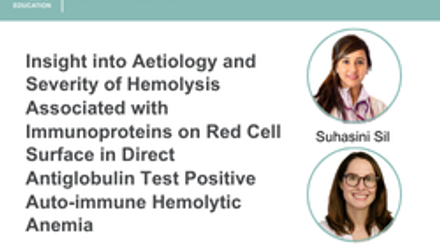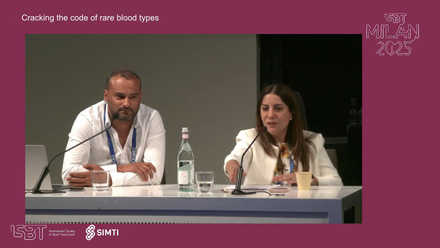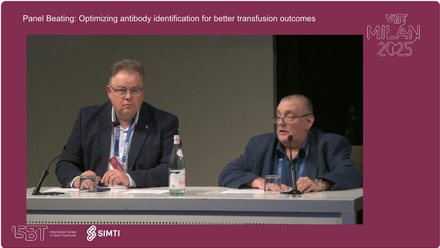The Fetal Maternal Immunology session included the following presentations:
1. Cecile Toly-Ndour: Rh disease prevention for women with partial D: is routine antenatal anti-D prophylaxis useful?
2. Mees Bruin: Natural course of pregnancies with alloantibodies against human platelet antigen HPA-1a
3. Renske van 't Oever: Natural course of hemolytic disease of the fetus and newborn after pregnancy with intrauterine transfusions
4. Jonas Lowack: HLA class I antigen knock out endothelial cells, a tool for the detection of endothelial-specific anti-HPA-1a alloantibodies
5. Xueyu Jiang: Pre-administration of baicalin inhibits red blood cell immunization in a mouse model of red blood cell transfusion
6. Ellen van der Schoot: Fetal RHD genotyping by droplet digital PCR for D variant mothers or children
MODERATORS: Agneta Wikman, Alan Lazarus
After the presentation, there was a questions and answers session, which is also included in the recording.
Abstract
Rh disease prevention for women with partial D: Is routine antenatal anti-D prophylaxis useful?
C Toly-Ndour1, A Floch2,3, S Huguet-Jacquot1, F Boussa-Khettab1, V Muralitharan2, H Delaby1, J Beaud1, N Boutarfa1, J Babinet1, C Tournamille2,3, F Pirenne2,3, A Mailloux1
1Service d’Hémobiologie Fœtale et Périnatale, Centre National de Référence en Hémobiologie Périnatale CNRHP, Hôpital Saint-Antoine, AP-HP, PARIS, 2Laboratoire de Biologie Médicale de Référence en Immunohématologie Moléculaire, Etablissement Francais du Sang Ile-de-France, 3Université Paris Est Creteil, INSERM U955 Equipe Transfusion et Maladies du Globule Rouge, IMRB, Creteil, France
Background: Variant RHD alleles are often responsible for a weakened expression of the D antigen. Partial D phenotypes are expressed by some of these variants and characterised by an altered RhD protein. Pregnant women with partial D may develop allo-anti-D if their foetuses’ red blood cells (RBC) express the conventional D antigen. Routine antenatal prophylaxis (RAP) consists of the administration of 1000 to 1500 UI anti-D immunoglobulin (RhIg) to D-negative women at the beginning of the third trimester to prevent maternal anti-D immunization caused by small foetal-maternal haemorrhages. It is often proposed to women with partial D, or a weakened D antigen expression in the absence of RHD genotyping results, with little evidence to support this practice. Indeed, some RhIg may bind to the patient's RBC and not be available to clear foetal D-positive RBC from the maternal blood.
Aims: We aimed to determine the proportion of women with RHD variants giving birth in the Ile de France Region (Paris area) and the usefulness of RAP for women with partial D.
Methods: We collected data from samples received between January 1, 2020 and December 31, 2021 at the National Reference Center in Perinatal Haemobiology, that performs Rh disease prevention tests to determine the need for RhIg injection for patients in 27 maternity wards in the Paris area.
Maternal RHD genotyping results (when available) were collected for patients with a weakened D antigen expression. For patients who received RAP, the D phenotype of the newborns and the results of the antibody screening test were collected to determine if RhIg was still present at delivery.
Pharmacokinetic curves of anti-D concentrations were determined through logarithmic regression for each D variant, considering the date of the last RhIg injection for women who received RAP and/or targeted antenatal prophylaxis due to an intercurrent event in the third trimester.
Results were compared to a control group of D-negative pregnant women who delivered during the same period.
Results: Among 11,609 samples received, 217 patients (1.9%) had a weakened expression of the D antigen : 19 weak D type 1 (9%), 6 weak D type 2 (3%), 14 weak D type 3 (6%), 83 weak D type 4.0/4.1 (38%), 34 DAR (16%), 15 DAU (7%), and 8 rare variants (4%). Maternal RHD genotyping was not performed or the variant not identified in 38 (18%) patients.
Among patients who had a D-positive newborn and received only RAP: 5% (2/38) of patients with weak D type 4.0/4.1 had detectable anti-D at delivery, in contrast with 58% patients with DAR (7/12), 60% patients with DAU (3/5) and 83% in the D-negative control group (20/24). Pharmacokinetic curves show a progressive decrease of anti-D concentration over time for DAR and DAU variants, similar to D-negative controls, but a rapid decline in the days following RhIg injection for weak D type 1 and weak D type 4.0/4.1.
Summary/Conclusions: The usefulness of RAP seems to differ between D variants, suggesting it may be useless for weak D type 4.0/4.1 (supporting the recent evolution of the national recommendations for these variants) but could be useful for patients with DAR or DAU variants. Future studies will need to evaluate the appropriate RhIg dose (probably higher than 1500 UI/mL) or the benefit of multiple RhIg injections at the third trimester, to be more efficient in preventing anti-D immunization in women with partial D variants.






















